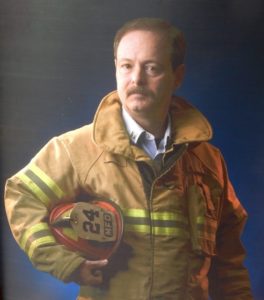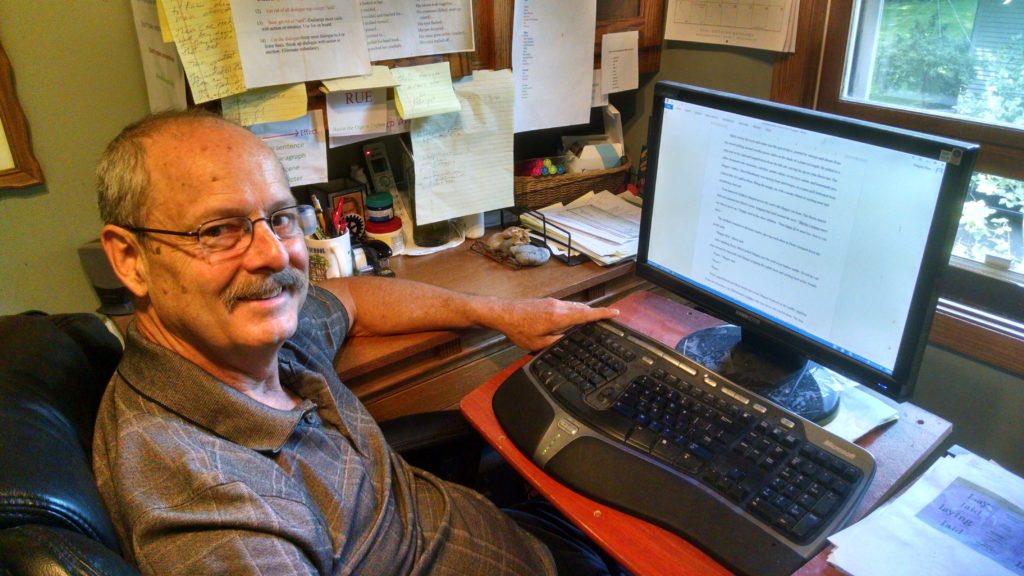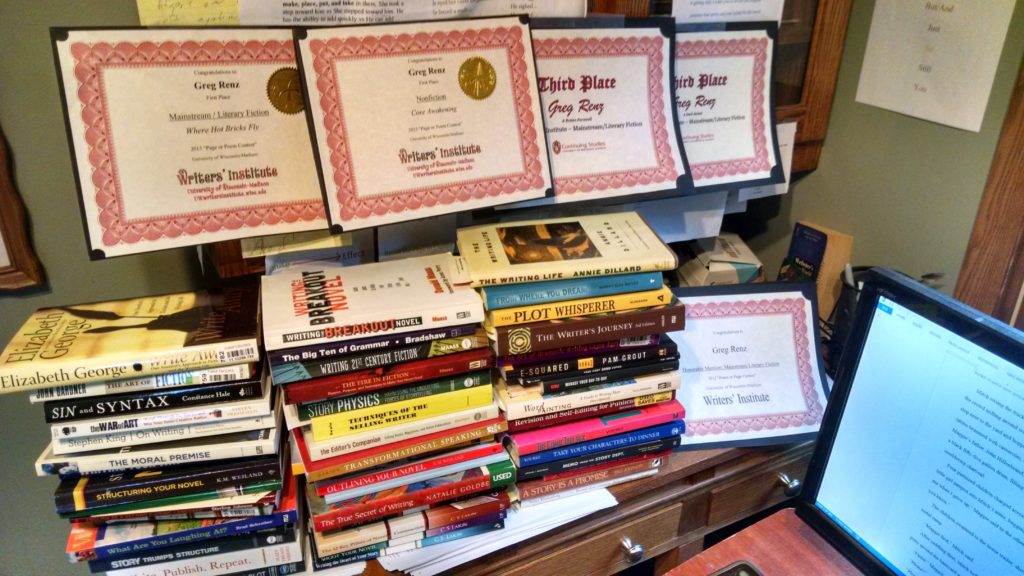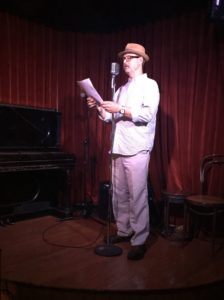 When Gregory Renz retired from firefighting ten years ago in July 2008, he had no clue how to write fiction. But he sure could tell a good story. When he saw the effect his stories had on an audience, he decided to put his storytelling on the page.
When Gregory Renz retired from firefighting ten years ago in July 2008, he had no clue how to write fiction. But he sure could tell a good story. When he saw the effect his stories had on an audience, he decided to put his storytelling on the page.
Last week, on this website, Gregory told how he found a publisher for his first novel, Beneath The Flames. His story is one of hard work, dedication to the craft of writing — and persistence.
Over the course of eight years, Gregory studied the craft of writing (seriously.) He read more than 80 books on the subject of writing, and attended dozens of conferences, workshops and seminars from Wisconsin to St. Augustine, Florida. He hired a professional coach, and submitted his work to 4 professional editors. He lost track of the number of times he rewrote/revised/edited his manuscript, but figures it was between 15-20 times. He queried 90 literary agents, was accepted by two, but decided they were not the right fit.
Devil’s In The Details
This week I followed up by asking Gregory, whom I first met at the Algonkian Author-Mentor Workshop in St. Augustine, Florida, to give us specifics about his writing journey.
Where did you learn to write fiction?
The courses I took were through the University of Wisconsin Continuing Studies in Writing. I signed up for How to Write Compelling Fiction, Take Your Characters to Dinner, The Dialogue Shop, Grammar and Punctuation: Paths Toward Clarity. I needed to take these courses before ever considering writing my novel.
The most eye-opening thing I learned in the first course was that I knew nothing about the craft of writing fiction and that I had much to learn before attempting to write a novel. Thanks to some gifted and patient instructors, I did not give up. I took several courses from Christine DeSmet, who became my writing coach last year.
What conferences, workshops, and seminars did you attend?

Some of the workshops and conferences attended: UW Writers’ Institute; UW Write by the Lake, an intensive week-long workshop; UW Weekend with Your Novel: The Wisconsin Writers Association Conference; The Chicago Writers Conference: The Writers Hotel Workshop and Conference in Manhattan; and The Algonkian Workshop
Some of the online courses took 6-8 months to complete. Workshops and conferences ranged from one day to one week.
How much in $$$ have you invested on courses, editors, books?
At least $15,000.
What did you learn from the Algonkian Workshop in St. Augustine? (Had to ask this one since this is the workshop at which I met Gregory.)

I found the Algonkian Workshop brutally honest about commercial fiction and what agents and publishers look for. The most valuable aspect of this workshop for me was polishing my pitch. During pitch sessions at conferences, I was complemented on my pitch and storytelling abilities and many times asked for pages. But rejections still followed.
With the knowledge I gained from Algonkian and these rejections, I realized my protagonist’s emotional Hero’s Journey did not fit the commercial fiction package that New York agents and publishers were looking for. I should add that the best piece of advice I received at Algonkian was from Pulitzer Prize winning author Robert Olen Butler. He told me that my writing was emotional and gripping and I should continue to write from deep inside and forget about writing to the commercial market.
Is there any other really good piece of advice you got from any other workshop?
Perspiration is far more important than talent. Can’t remember where I heard this. My writing coach shared how frustrating it was to hear that one of her very talented writers was no longer writing. Without persistence and perspiration, talent alone rarely leads to writing success.
You mentioned meeting Hank Phillippi Ryan: what was her best advice?

Her talk was inspirational in that she shared her challenging journey from television journalist to best-selling author and the work that went into learning the craft. If you’re willing to put in the work it can happen. She had this advice for us:
“I often counsel writers to simply go on. Get to the end of the story, even if you are thinking ‘this is terrible’ the entire time. Let go of your inner editor, and let go of your fear that you are ‘bad.’ Once you see those words on the page, hurray. Now you can fix them.”
Why did you turn down representation with two agents?
The story I put eight years into creating is the Hero’s Journey of a young man torn between the worlds of a Wisconsin farm and the inner city of Milwaukee. I used the ageless structure of the beats and archetypes of the Hero’s Journey to tell this emotional story.
The agents wanted to gut the story and remove the farm setting and focus on my protagonist, a firefighter, and how he rescues a young girl from a street gang. This would have eliminated the family dynamics and internal struggles that play such an important part of this story.
Had I been offered contracts from these agents several years ago, I’m sure I would have jumped at signing with them. Now that I have confidence in the story and myself, I know I would have been miserable writing the story they wanted.
Can you name five of the 80 craft books you read which you found the most useful?
 Writing 21st Century Fiction, Donald Maass
Writing 21st Century Fiction, Donald Maass
Stephen King/On Writing
Story Physics, Larry Brooks
The Writer’s Journey, Christopher Vogler
Beyond the First Draft, Deep Novel Revision, Laurel Yourke
How much did you pay the professional editors? What did they do? Did you agree with them?
My first edit was a developmental edit or treatment that cost $800. This was extremely valuable in eliminating redundancies and prioritizing which plot layers to leave in the story and which ones to eliminate. The first draft was 176,000 words so there was way more story than needed. I mostly agreed with this editor since he has a long list credentials in the publishing field.
An excellent editing experience came through the weeklong workshop, Write by the Lake at the UW. Christine DeSmet, who is also my writing coach, offers a master class in novel writing at this workshop. It’s a small group, unusually around six people. Before the workshop starts, everyone sends her their full manuscript for her to edit and critique. Everyone else in the workshop also shares their manuscript with everyone else. Christine then gives everyone homework where she picks out specific things we are to critique for each other like the first chapter, midpoint crisis, ending, etc. We are only required to read these sections of each other’s work, but we have the complete manuscripts and we all ended up reading these entire manuscripts. The writing was that good.
This masters workshop only cost $750.
Did You Get Any Conflicting Advice?

Another workshop where I received some insightful edits was The Writer’s Hotel in New York. Before the conference started, I sent my manuscript for critique and edits. I received two full manuscript critiques from the director and associate director of the workshop. These were both developmental and line edits. During the weeklong workshop our group discussed our work with insights added by the instructor.
I believe the conference cost around $2500 which is what you might pay an editor for a full-manuscript developmental and line edit.
I should add that I have received plenty of contradictory advice from professional editors. One said there should be more internal dialogue so the reader would know more about the thoughts of the protagonist. Another said I should eliminate much of the internal dialogue because the action and external dialogue says everything the reader needs to know about what the protagonist is thinking and I should let the reader fill this in.
Hmm. In the end, I went with a middle ground that I felt worked.
Gregory’s novel, Beneath The Flames is scheduled for publication in Fall 2019 by HenschelHAUS Publishing.
You can follow Gregory on Twitter @glrenz
Thank you again, Joanna. Your blog is getting rave reviews on my Facebook page. So many of my writing friends are thanking me for sharing my journey thanks to you.
That delights me Greg. It’s such a great journey to share. Keep us posted on your progress, please.